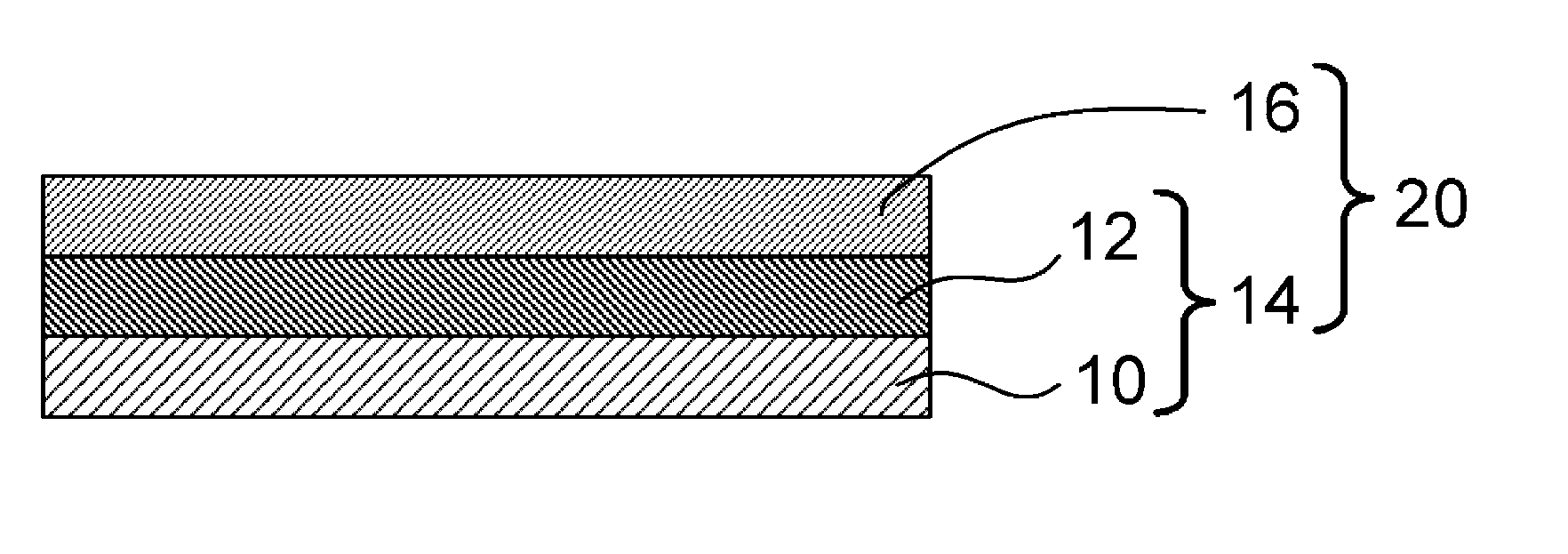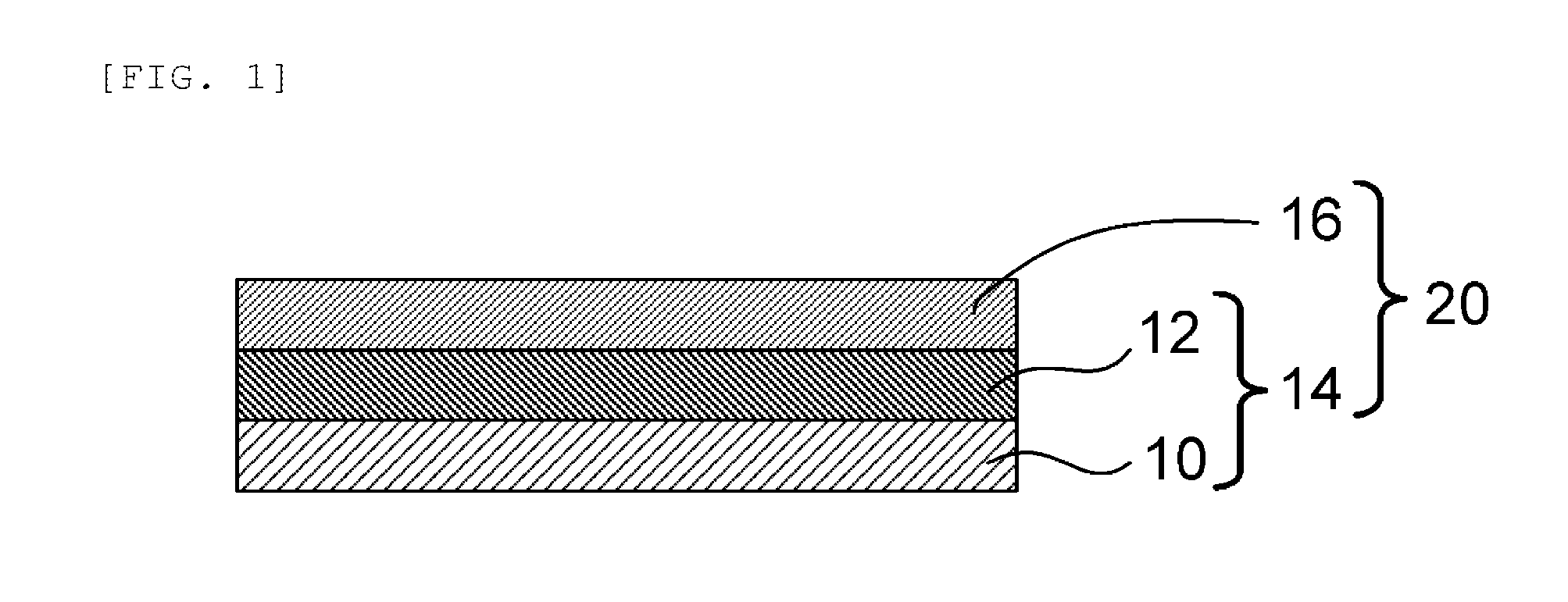Aqueous liquid composition, aqueous coating, functional coating film, and composite material
a technology of aqueous liquid and functional coating, applied in the direction of electrode manufacturing process, group 5/15 element organic compounds, synthetic resin layered products, etc., can solve the problems of low high volatility of organic solvents, and inferior film-forming ability of organic solvent-based coating formulation, etc., to achieve excellent adhesion to a base material, low environmental load, and adequate viscosity
- Summary
- Abstract
- Description
- Claims
- Application Information
AI Technical Summary
Benefits of technology
Problems solved by technology
Method used
Image
Examples
example 1
(1) Conductive Coating Formulation
[0111]Acetylene black (10 parts) and the aqueous liquid composition of Sample 1-1 (90 parts) were combined, and were then stirred and mixed at a rotational speed of 60 rpm for 120 minutes in a planetary mixer to prepare a conductive coating formulation.
(2) Conductive Coating Film
[0112]The prepared conductive coating formulation was applied by a comma roll coater onto one side of a collector formed of an aluminum foil (thickness: 20 μm). The thus-coated collector was then heated and dried for 2 minutes in an oven controlled at 110° C., and was further heated and dried for 2 minutes in the oven controlled at 180° C., so that a conductive coating film of 1 μm thickness was formed on the one side of the collector.
(3) Solubility / Swellability
[0113]A solution with 1 mole of LiPF6 dissolved as a supporting salt in a mixed solvent of EC (ethylene carbonate), PC (propylene carbonate) and DME (dimethoxyethane) combined together at 1:1:2 (volume ratio) was prep...
examples 2 to 19
, Comparative Examples 1 to 2
[0115]Conductive coating films were prepared as in Example 1 described above except that the corresponding aqueous liquid compositions shown in Table 2 were used in place of the aqueous liquid composition of Sample 1-1. The evaluation of solubility / swellability and the measurement of surface conductivity were also conducted as in Example 1. The results are shown in Table 2. It is to be noted that a 5% solution of polyvinylidene fluoride in NMP (PVDF solution) was used in Comparative Example 2.
TABLE 2SurfaceAqueous liquidConductive materialSolubility / resistivitycompositionKindpartsswellability(Ω / □)Ex. 1Sample 1-1AB10Good1.3 × 103Ex. 2Sample 1-2AB7Good1.9 × 103Ex. 3Sample 1-3AB10Good2.1 × 103Ex. 4Sample 1-4AB5Good7.1 × 102Ex. 5Sample 1-5AB13Good1.3 × 103Ex. 6Sample 1-6AB15Good8.9 × 102Ex. 7Sample 1-7AB10Good1.7 × 103Ex. 8Sample 1-8AB8Good2.6 × 103Ex. 9Sample 1-9AB10Good9.8 × 102Ex. 10Sample 1-10AB6Good1.0 × 103Ex. 11Sample 1-11AB7Good9.5 × 102Ex. 12Sample ...
example 20
(1) Positive Electrode Plate
[0116]The conductive coating formulation of Example 1 was applied by a comma roll coater onto one side of a collector formed of an aluminum foil (thickness: 20 μm). The thus-coated collector was then heated and dried for 2 minutes in an oven controlled at 110° C., and was further heated and dried for 2 minutes in the oven controlled at 180° C., so that a conductive coating film of 1 μm thickness was formed on the one side of the collector.
[0117]A LiCoO2 powder (particle sizes: 1 to 100 μm) (90 parts), acetylene black (5 parts) and a 5% solution of polyvinylidene fluoride in NMP (PVDF solution) (50 parts) were combined, and were then stirred and mixed at a rotational speed of 60 rpm for 120 minutes in a planetary mixer to obtain a slurry-form, positive electrode formulation with the positive-electrode active material contained therein. The thus-obtained, positive electrode formulation was applied onto a surface of the conductive coating film by a comma rol...
PUM
| Property | Measurement | Unit |
|---|---|---|
| temperature | aaaaa | aaaaa |
| temperature | aaaaa | aaaaa |
| temperature | aaaaa | aaaaa |
Abstract
Description
Claims
Application Information
 Login to View More
Login to View More - R&D
- Intellectual Property
- Life Sciences
- Materials
- Tech Scout
- Unparalleled Data Quality
- Higher Quality Content
- 60% Fewer Hallucinations
Browse by: Latest US Patents, China's latest patents, Technical Efficacy Thesaurus, Application Domain, Technology Topic, Popular Technical Reports.
© 2025 PatSnap. All rights reserved.Legal|Privacy policy|Modern Slavery Act Transparency Statement|Sitemap|About US| Contact US: help@patsnap.com


